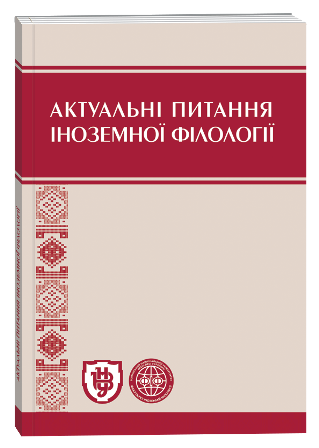METAPHOR, METONYMY AND EVALUATION AS POLITICAL TOOLS OF DEMOCRATS IN AMERICAN POLITICAL DISCOURSE
DOI:
https://doi.org/10.32782/2410-0927-2024-20-2Keywords:
public speech, metaphor, metonymy, evaluation, attitude, persuasionAbstract
The article explores the interaction of metaphor, metonymy, and evaluation in American political discourse using examples of public speeches by representatives of the US Democratic Party, where they try to persuade the public of economic victories through positive self-evaluation and devaluation of others. The main task is to examine whether there is a relationship between the ideological positions of the speakers and the subjects being evaluated. The article also analyzed and established the theoretical basis of previous studies covering the peculiarities of political discourse and analyzed the influence of metaphor and metonymy on the formation of evaluative judgments of addressees. The analyzed public speeches testify to the fact that metaphors and metonymies abound in this type of political discourse and that mostly such linguistic phenomena coincide with evaluation. A closer look at the relative frequencies indicates that political candidates consistently rely on different ways of generating favorable attitudes to create quite different images that will help them win votes in future elections while reducing the chances of opposing candidates to win. Focusing on judgments, politicians form an opinion about the normality (that is, how special/(un)ordinary is the state of human behavior), about the ability (that is, an assessment of competence and/or abilities) of the evaluated elements. A positive evaluation of human behavior from an ethical point of view contributes to optimistic perception of the speech in general. The results show that political figures use evaluation in their speeches in particular as a tool to justify and persuade the audience of the correctness of their economic decisions. At the same time, politicians use evaluation not only as an expression of their own ideological views, but also as an ideological tool that would contribute to their intentions to come to power in the future.
References
Dijk T A. van. Ideology: A Multidisciplinary Approach / T. A. van Dijk. London : Sage Publications, 1998. 365 р.
Dijk T. A. van. War rhetoric of a little ally: Political implicatures and Aznar’s legitimatization of the war in Iraq / T. A. van Dijk. Journal of Language and Politics. 2005. Vol. 4. Iss. 1. P. 65-91.
Mussolff A. The study of metaphor as part of critical discourse analysis. Critical Discourse studies. Published online. Vol. 9. Iss. 3. P. 301-310. URL: https://doi.org/10.1080/17405904.2012.688300 (дата звернення: 19.02.2024).
Littlemore J. Metonymy: Hidden Shortcuts in Language, Thought and Communication. Cambridge : Cambridge University Press, 2015. 227 p.
Lakoff G., Turner M. More than Cool Reason: A Field Guide to Poetic Metaphor. Chicago : The University of Chicago Press, 1989. 237 p.
Díez-Prados M. The use of metaphor and evaluation as discourse strategies in pre-electoral debates: Just about winning votes. Exploring Discourse strategies in social and Cognitive Interaction: Multimodal and Cross-linguistic Perspectives. Amsterdam : John Benjamins, 2016. P. 215-244.
Kövecses Z. Metaphor: A Practical Introduction. Oxford : Oxford University Press, 2010. 2nd Ed. 400 p.
Lakoff G., Johnson M. Metaphors we live by. Chicago : The University of Chicago Press, 2003. 276 p.
Cabrejas-Peñuelas A. B., Díez-Prados M. Positive self-evaluation versus negative other-evaluation in the political genre of pre-election debates. Discourse and society, 2014. Vol. 25. Iss. 2. P. 159-185. URL: https://doi.org/10.1177/0957926513515601 (дата звернення: 19.02.2024).
Barcelona A. Clarifying and applying the notions of metaphor and metonymy within Cognitive Linguistics: an update. Metaphor and Metonymy in Comparison and Contrast. Berlin : Mouton de Gruyter, 2002. P. 202-277.
Paris R. Kosovo and the metaphor war. Political science Quarterly. 2002. Vol. 17. Iss. 3. P. 423-450.
Semino E. Metaphors in Discourse. Cambridge : Cambridge University Press, 2008. 247 p.
Catalano Th., Waugh L. R. Representations of power: A critical multimodal analysis of US CEOs, the Italian Mafia and government in the media. Journal of Language and Politics. John Benjamins Publishing Company, 2016. Vol. 15. Iss. 6. P. 790-817. URL: https://doi.org/10.1075/jlp.15.6.07cat (дата звернення: 19.02.2024).
Ferrari F. Metaphor at work in the analysis of political discourse: investigating a “preventing war” persuasion strategy. Discourse and society. 2007. Vol. 18. Iss. 5. P. 603-625.
Neagu M. I. Decoding Political Discourse: Conceptual Metaphors and Argumentation. London: Palgrave Macmillan, 2013. P. 39-72.
Meadows B. Distancing and showing solidarity via metaphor and metonymy in political discourse: a critical study of American statements on Iraq during the years 2004-2005. Critical Approaches to Discourse Analysis Across Disciplines. 2006. Vol. 1. Iss. 2. P. 1-17. URL: https://www.researchgate.net/publication/242236958 (дата звернення: 19.02.2024).







